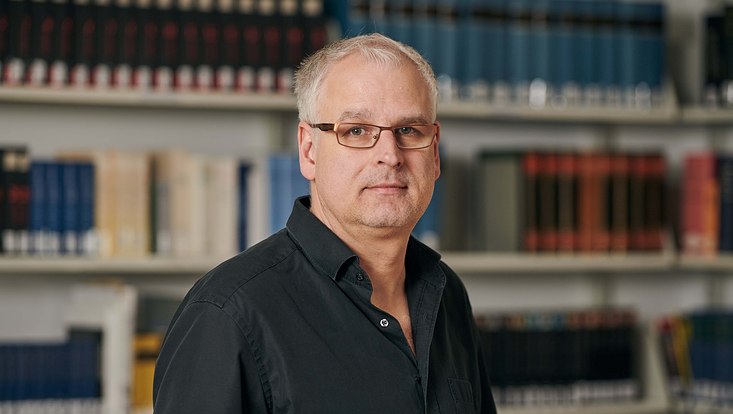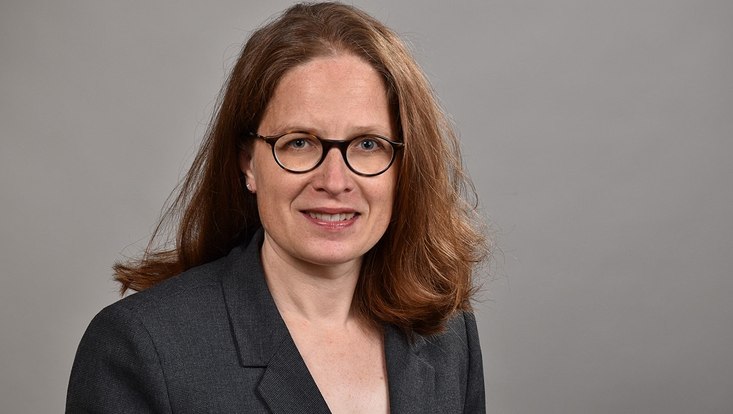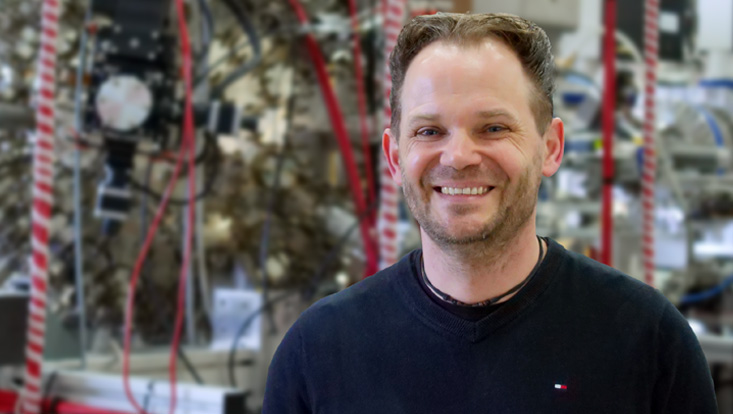Welcome aboard!How are different perspectives linguistically visualized and perceived?Prof. Dr. Stefan Hinterwimmer strengthens Humanities.
9 April 2024, by Hinterwimmer/Red.

Photo: Rudi Feuser / German Research Foundation Visual Communication
Every year, Universität Hamburg welcomes numerous new researchers. This series introduces them and their areas of research. This time: linguist Prof. Dr. Stefan Hinterwimmer.
Prof. Dr. Stefan Hinterwimmer left the Bergische Universität Wuppertal to join the Faculty of Humanities in summer semester. He has a professorship for German linguistics with a focus on semantics.
My research area in 3 sentences:
Generally, my research area lies in semantics and pragmatics. This means that I am generally concerned with how the meanings of oral or written utterances emerge from the interplay of the following components: learned word meanings, general rules on the combination of these meanings, assumptions about the context in which an utterance is made, and the speaker’s intention.
My current research focuses on the mechanisms whereby utterances and texts create perspective, especially with regard to the possibility of creating simultaneous multiple perspectives. I also look at the question as to how spoken language and gestures used with language interact in establishing perspectives. More topics that currently concern me and that I have started to research are the relationship between grammatical and social and/or biological sex and gender and the question as to what extent social power relations become anchored also in linguistic structures or what role these structures play in establishing and maintaining power relations.
This is how I explain my research to my family:
Even if we do not actually wish it so, for example on rides in crowded buses or trains where we would rather read or think in peace: we simply cannot do otherwise than interpret the utterances of people around us—providing they are made in a language we master. This is true even when the statements consist of sentences that we have never heard and are about things that have little to do with our own lives. I would like to understand more exactly how that works and how what we have learned, subconsciously internalized rules, general knowledge about the world in which live, and the assumptions about the intentions of the speaker in question interact.
In Hamburg, the city and the University, I am looking forward to:
I have known Hamburg for several years now thanks to visits to friends living there, and each and every time I am enthralled by the great spectrum of cultural opportunities, the architectural beauty of the city, and how green Hamburg is for a city of its size. And the harbor and the proximity to the ocean have always very much fascinated me. So I am now looking even more forward to spending time in Hamburg and to be able to take advantage of all of these things regularly.
As far as the University is concerned, I am very much looking forward to being able to research and teach at such a research-oriented University and I am as keen to get to know my students as I am to get to know my future colleagues. I hope for a lot of exciting cooperation in research and in teaching.
My research is important to society because:
I would like to contribute to the sound understanding of the mechanisms that establish linguistic perception and the development of the ability to recognize changes in perspective and the simultaneity of multiple perspectives in texts and utterances.
Because the ability to take in and, at a meta-level, represent different perspectives is an important condition for participation and peaceful coexistence in an increasingly diversifying, globally linked society, my research in this area is highly socially relevant and has a lot of potential for knowledge exchange with an interested public.
I also find it important to critically reflect upon the different types of discrimination in society, in the context of university research and in teaching. Because language plays a central role in the production, maintenance, and establishing of stereotypes and scapegoats, including to the extent of dehumanizing entire populations, and also the legitimation of the unjust distribution of a society’s resources, linguistics plays an important role—better understanding these mechanisms is a condition for dismantling them.
This is why students should attend my courses:
Generally, in my teaching, it is important to me to interest my students in the high degree of order to be discovered behind the initially confusing complexity of linguistic phenomena and to impart to them that linguistic concepts and findings can make a great contribution to understanding the effects of language in society at large.
I am also especially interested in the links between theory and empirical evidence, which is why I always encourage students in my seminars to undertake small empirical studies in term papers and larger ones, like experiments and corpus studies, to review theoretical concepts and analyses and I support them as they do this.
My current and planned research projects on perspective, multimodality, and the connection between grammatical and semantic sex and gender give everyone outstanding possibilities for term papers and final theses. I am also convinced that excellent training in the subject in teacher training programs has to go hand-in-hand with didactic preparation that revolves around the question about how linguistic findings can be meaningfully imparted in school classrooms. Therefore, in my courses, I consciously link linguistic findings to classroom practices.
These are my plans at Universität Hamburg:
In Hamburg, I would like to continue with and expand upon my research on perspectives and multimodality and more strongly incorporate social aspects. In connection with this, I am planning, first of all, to continue with a joint project with Prof. Dr. Cornelia Ebert from Goethe-Universität Frankfurt on multimodality and perspectives that is part of the German Research Foundation’s Visual Communication program. In the second project phase, we want, on the one hand, to focus on a comparison between the interplay of spoken language and gestures accompanying speech and, on the other, on sign language to express perspective. We will also work with colleagues from the Institute of German Sign Language at Universität Hamburg. We also want to look at the interplay of information imparted in writing using images and memes to express perspective, especially with regard to the question as to how both modalities work together to enhance or degrade and mark individuals and groups to be identified with or demonized.
Secondly, I plan to apply for grants from the German Research Foundation for 2 individual projects. In the first one, I would like to study how choosing different types of referential utterances identifying individuals and groups in public and political discourse influence the perspectives of the receivers towards these individuals and groups and thus, how processes of inclusion and exclusion may be encouraged. In the second project, I am focusing, on the one hand, on the question as to how children interpret and process multiple perspectives in texts and shifts in character and narrative perspectives and how they realize them in their own writing. On the other, I focus on the question as to whether multiple perspectives hinder a child’s understanding of text or whether, on the contrary, thanks to the possibility for empathy and identification with prominent characters in the text, they can lead to greater textual understanding. For this project, I am seeking cooperation with Hamburg schools in which students can also be integrated into teaching projects.
Thirdly, I am a co-project head for 2 projects for which we are applying for grants from the German Research Foundation as part of the collaborative research center Prominence in Language based in Cologne, and I would like to exploit this to forge links between Universität Hamburg and other German universities. In the first project that I am seeking a grant for with Dr. Elen LeFoll, we are looking at the extent to which grammatical genus hierarchies or social gender hierarchies are reflected in prominence hierarchies in German, French, and English. In the second project, for which I am applying for a grant with Prof. Dr. Sophie Repp, we are looking at the conditions under which pronouns can take on not only the entire content of a negated sentence but also the content of the sentence in question without the negation.
Because my research on interpretation and the linguistic realization of perspective by elementary schoolchildren and the role of language in itself or language in combination with visual information in the (re)production and maintenance of stereotypes in particular is ripe for knowledge exchange with schools, I am planning to organize courses and workshops at Hamburg schools in which students, too, can present findings in their own small research projects.
Reaching out to the world: I work with the following international and federal institutions and universities:
I am currently working with Jesse Harris from UCLA and Dorothy Ahn from Rutgers University as part of a series of joint experimental studies related to perspective, grammatical gender, and semantic gender, as well as the interpretation of different types of pronouns and articles in German and English. Furthermore, I am cooperating, as part of a network of researchers from Canada, Ghana, the Czech Republic, Ukraine, and Germany funded by the German Research Foundation, to create guidelines to identify and classify demonstrative and definite articles in different languages.


